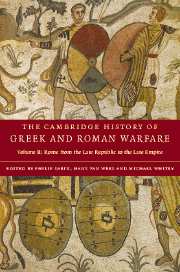Book contents
- Frontmatter
- Part I The Late Republic and the Principate
- 1 International relations
- 2 Military forces
- 3 War
- 4 Battle
- 5 Warfare and the state
- 6 War and Society
- Part II The later Roman Empire
- Chronological table
- Glossary
- List of ancient authors
- Bibliography
- Index of ancient passages cited
- General index
- Map 6. The provinces under Trajan."
- References
1 - International relations
from Part I - The Late Republic and the Principate
Published online by Cambridge University Press: 28 March 2008
- Frontmatter
- Part I The Late Republic and the Principate
- 1 International relations
- 2 Military forces
- 3 War
- 4 Battle
- 5 Warfare and the state
- 6 War and Society
- Part II The later Roman Empire
- Chronological table
- Glossary
- List of ancient authors
- Bibliography
- Index of ancient passages cited
- General index
- Map 6. The provinces under Trajan."
- References
Summary
introduction
The study of Roman international relations and attitudes to war and peace in the late Republic and the Principate poses fascinating problems. While there are many excellent modern studies of specific aspects there are few scholarly works which attempt an overview. In part this may be because no Greek or Latin literature of the period discussed these themes in an extended or systematic fashion. A modern appreciation has to draw on material scattered in literary, epigraphic, papyrological, numismatic and artistic sources.
It is vital not to elevate what have become, since the Renaissance, the norms of Western diplomacy to the status of universal practices and attitudes. We have to ‘forget about’ or, at least, question the existence in Rome of various things which we tend to regard as timeless: diplomatic archives and experts, topographical maps, continuity of relations between states (permanent embassies and the like) and proactive policies, even coherent and explicit policies at all. The preconditions which underpinned the emergence of the Western norms (a multiplicity of stable polities which recognized their broadly comparable levels of political power and cultural attainment) did not exist for Rome in this period. As we shall see, Roman ways of thinking about the Roman empire and its neighbours largely precluded the creation of structures similar to those of the post-Renaissance West.
- Type
- Chapter
- Information
- The Cambridge History of Greek and Roman Warfare , pp. 1 - 29Publisher: Cambridge University PressPrint publication year: 2007



